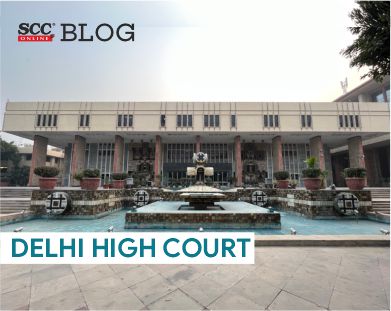Delhi High Court: In a suit filed seeking a decree of mandatory and permanent injunction in order to restrain the exhibition, broadcast, telecast and release of the series titled ‘Trial by Fire‘, to be aired on 13-01-2023 on its digital/OTT platforms, Yashwant Verma, J., refused to grant ad interim injunction stating that the narrative of the authors was available in the public sphere right from 2016, thus disentitling the plaintiff from the grant of ad interim reliefs.
On 13 June 1997, a fire broke out at the erstwhile Uphaar Cinema situated in Green Park, New Delhi. 59 innocent persons are stated to have lost their lives in the said incident. After the investigation, the plaintiff was convicted under Sections 120B read with Section 409, Section 120B and Section 201 read with Section 120B, Penal Code, 1860 (IPC) on account of tampering of evidence.
It is alleged that on 04-01-2023, the official trailer of the web series —Trial by Fire came to be released. It is alleged that the said series claims to be based on the Book authored by defendant 4 and 5 and that it purports to be based on true events. The plaintiff asserts in the suit that his acquaintances reached out to him and brought to his attention that the trailer of the impugned series would lead to a lowering of the reputation of the plaintiff.
The Court noted that the Courts have formulated the high threshold test because the injunction would essentially be sought at a stage when the offending material is either not available to be evaluated and examined or where it is impracticable to arrive at even a prima facie conclusion whether the content is defamatory or libelous.
The Court noted that apart from the often-repeated trinity test of prima facie case, the balance of convenience and irreparable injury, courts are also bound to weigh in consideration whether the issuance of the injunction would cause greater harm and perpetuate injustice, the time when the plaintiff first derived knowledge of the offending material, whether the plaintiff, if not having acquiesced, remained inert or failed to take proactive action for the protection of its rights and whether it has approached the Court in good faith. These aspects assume greater significance when what is sought is a pre-publication or broadcast injunction.
The Court recorded that a pre-publication or broadcast injunction would essentially be sought at a stage when the offending material is either unavailable to be comprehensively reviewed and assessed or where it is alleged that there is a grave, imminent and immediate possibility of violation of rights. In such a situation the following factors would clearly be entitled to be accorded primacy, i.e., how prompt the plaintiff approaches the Court, its obligation to establish, at least prima facie, that the impending publication/broadcast is completely divorced from the truth, replete with falsehood, or evidences an imminent vilification of the individual.
On the issue of whether a pre-broadcast injunction is liable to be granted in the facts of the present case, the Court noted that the contents of the Book in respect of which an injunction had come to be granted, and the various allegations made therein in respect of a public personality, had been in the public domain and thus clearly disentitled the plaintiff to the grant of any pre-publication injunction. It was emphasized that while a prior publication may not qualify as a public document what is important to be borne in mind is whether the subject matter itself was in the public domain, thus, the narrative of the authors was available in the public sphere right from 2016, disentitling the plaintiff from the grant of ad interim reliefs.
Thus, the Court refused the grant of interim injunction against the defendants.
[Sushil Ansal v. Endemol India Private Limited, 2023 SCC OnLine Del 121 decided on 12-01-2023]
Advocates who appeared in this case :
Mr. Siddharth Agarwal, Sr. Adv. with Mr. Gautam Khazanchi, Mr. Kumar Vaibhav, Ms. Somaya Gupta & Ms. Sukanya Joshi, Advocates for plaintiff
Mr. Sandeep Sethi, Sr. Adv. with Mr. Nidhish Mehrotra, Ms. Anushree Rauta, Mr. Rahul Dhote, Mr. S.S. Ahluwalia, Ms. Devangini Rai, Mr. Mohit Bangwal, Ms. Narayani P. Chaudhary, Advs. for D-1 Mr. Nidhish Mehrotra, Ms. Anushree Rauta, Mr. Rahul Dhote, Mr. S.S. Ahluwalia, Ms. Devangini Rai, Mr. Mohit Bangwal, Ms. Narayani P. Chaudhary, Advs. for D-2 Mr. Rajiv Nayar and Mr. Amit Sibal, Sr. Advs. with Mr. Manav Kumar, Mr. S. Debarata Reddy, Ms. Shivangi Sharma, Mr. Saurabh Seth, Ms. Manjula Mr. Sandeep Sethi, Sr. Adv. with Mr. Nidhish Mehrotra, Ms. Anushree Rauta, Mr. Rahul Dhote, Mr. S.S. Ahluwalia, Ms. Devangini Rai, Mr. Mohit Bangwal, Ms. Narayani P. Chaudhary, Advs. for D-1 Mr. Nidhish Mehrotra, Ms. Anushree Rauta, Mr. Rahul Dhote, Mr. S.S. Ahluwalia, Ms. Devangini Rai, Mr. Mohit Bangwal, Ms. Narayani P. Chaudhary, Advs. for D-2 Mr. Rajiv Nayar and Mr. Amit Sibal, Sr. Advs. with Mr. Manav Kumar, Mr. S. Debarata Reddy, Ms. Shivangi Sharma, Mr. Saurabh Seth, Ms. Manjula
*Arunima Bose, Editorial Assistant has reported this brief






